|
|
|
Sort Order |
|
|
|
Items / Page
|
|
|
|
|
|
|
| Srl | Item |
| 1 |
ID:
130237
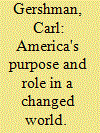

|
|
|
|
|
| Publication |
2014.
|
| Summary/Abstract |
Public opinion reports on Americans' attitudes toward foreign policy sketch a picture of retrenchment, war-weariness, and skepticism toward global engagement, even as there is also a growing concern that the world is increasingly unstable and dangerous. Nothing about this picture is new or controversial. Some may worry about it more than others, but it is now commonly accepted that the US is downsizing its international role, and that the administration, the Congress, and the general public are more absorbed with domestic concerns than with foreign challenges or threats.
|
|
|
|
|
|
|
|
|
|
|
|
|
|
|
|
| 2 |
ID:
130238
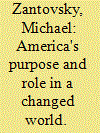

|
|
|
|
|
| Publication |
2014.
|
| Summary/Abstract |
It is not a new observation that, just as the twentieth century started late, with the shots in Sarajevo, so did the twenty-first century, with the September 11th attacks. Compared to the conflagration that followed the first event, whose centennial this year is a welcome opportunity for some belated soul-searching, the bloodshed that started with the second event has been limited, but its consequences may have been just as profound. The two American administrations that inherited the post-September 11th world have since struggled, along with the rest of the world, with the consequences. One chose to confront the evil head-on, in order to eradicate its sources and deter its repetition, with mixed results. The other largely opted for seeing and hearing little evil, with results that the jury is still out considering.
|
|
|
|
|
|
|
|
|
|
|
|
|
|
|
|
| 3 |
ID:
132046


|
|
|
|
|
| Publication |
2014.
|
| Summary/Abstract |
With rapid China now the world's second-largest economy, the status and Wrole of China's think tanks have become an increasing concern. On the whole, the international status of China' s think tanks is not
commensurate with the country' s current international status. The University of Pennsylvania' s The Global Go To Think Tanks Report published in 2014 said that as of August 2013, China had 426 think tanks, second only to the U.S. with 1,828. But of the top 100 non-U.,S. think tanks in the world only 5 are Chinese, and in the 150 most in?uential global think tanks, only 6 are from China-with the rest mostly from Europe. China' s think tanks lack professionalism and in?uence.' This is why China has been pushing to improve its think tanks internationally. In April 2013, President Xi Jinping proposed building a "new think tank with Chinese characteristics". To date this has been the clearest statement from a leader of China on think tanks? Decision of the CCCPC on Some Major Issues Conceming Comprehensively Deepening the Reform was passed in the 3rd Plenary Session of the 18th CPC Central Committee held in 2013. It clearly proposed"the building of new think tanks with Chinese characteristics and developing
a sound decision-making advisory system". China' s think tanks must make an international transition, but how can they do this'? What specific challenges are there? This paper will analyze these questions.
|
|
|
|
|
|
|
|
|
|
|
|
|
|
|
|
| 4 |
ID:
128132
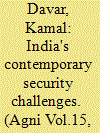

|
|
|
|
|
| Publication |
2013.
|
| Summary/Abstract |
India is the world largest democracy, the second most populous nation, one of the fastest growing economies, the fourth largest armed forces in the world and universally acknowledged to be an emerging global power. In 2010 joint study by the US National Intelligence Council and the European Union declared it as the world's third most powerful nation to the pleasant yet some disbelief of even a number of Indians! Yet India's progress and prosperity, it human development indices and the wide spectrum of security challenges confronting it, both internal and external, appear as varied and telling as the endemic diversity of India's demographic, social linguistic, religious, character and content besides a lack in economic inclusiveness or an equitable growth pattern. While millions are racing up the ladder of affluence, many more still live in sub-Sahara like conditions in abject poverty.
|
|
|
|
|
|
|
|
|
|
|
|
|
|
|
|
| 5 |
ID:
023775
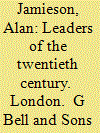

|
|
|
|
|
| Publication |
London, G Bell and Sons Ltd, 1970.
|
| Description |
385p.: maps.Hbk
|
| Standard Number |
0713516135
|
|
|
|
|
|
|
|
|
|
|
|
Copies: C:1/I:0,R:0,Q:0
Circulation
| Accession# | Call# | Current Location | Status | Policy | Location |
| 005027 | 923.2/JAM 005027 | Main | On Shelf | General | |
|
|
|
|
| 6 |
ID:
095272


|
|
|
|
|
| Publication |
2010.
|
| Summary/Abstract |
Almost immediately after signing a strategic arms treaty this month, President Barack Obama will have to focus his attention on another part of his nuclear policy agenda: securing vulnerable nuclear materials around the world.
|
|
|
|
|
|
|
|
|
|
|
|
|
|
|
|
| 7 |
ID:
118161


|
|
|
|
|
| Publication |
2012.
|
| Summary/Abstract |
What counts as evidence that the other side is sincere? Within mainstream international relations literature, scholars have focused on costly signals. We argue, however, that in the real world leaders do not simply look at costly signals, but they rely to an important extent on their personal impressions of other leaders, taking these as credible indicators of sincerity. Our approach thus builds both upon the literature on interstate communication and perceptions and upon more recent research in the field of neuroscience regarding affective information. To probe the plausibility of our theory, we focus on the indicators British Prime Minister Neville Chamberlain used to evaluate Germany sincerity in the late 1930s and Ronald Reagan employed to make sincerity judgments about Soviet intentions in the late 1980s. Additionally, we briefly discuss the 1961 Vienna Summit between Kennedy and Khrushchev as an illustration of how personal impressions can also result in negative assessments of sincerity. Our findings suggest that personal impressions are an important, but up until now relatively ignored, source of evidence for leaders of their counterparts' sincerity with significant implications for threat assessments and policy choices.
|
|
|
|
|
|
|
|
|
|
|
|
|
|
|
|
| 8 |
ID:
124181
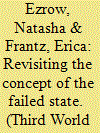

|
|
|
|
|
| Publication |
2013.
|
| Summary/Abstract |
The policy and donor communities have placed great importance on fixing 'failed states'. World leaders have cited failed states as one of the greatest threats to the global community. Nevertheless the concept of the failed state is currently subject to a backlash from the academic community. Scholars have criticised the failed states literature on theoretical, normative, empirical and practical grounds. We provide a brief overview of these main concerns and offer a more systematic method for measuring 'state failure'. Coming up with better ways of assessing how states underperform will enhance our understanding of how institutional decay affects stability and development and, most importantly, will provide an improved system of early warning for practitioners.
|
|
|
|
|
|
|
|
|
|
|
|
|
|
|
|
| 9 |
ID:
132473
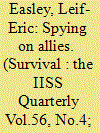

|
|
|
|
|
| Publication |
2014.
|
| Summary/Abstract |
Although some programmes crossed lines of propriety, US surveillance of partners did not constitute a breach of trust.
The United States is accused of monitoring the communications of other countries and collecting data on Internet users worldwide, following disclosures made by Edward Snowden, a former National Security Agency (NSA) contractor. US President Barack Obama implied that he did not order the NSA programmes for listening in on over 35 world leaders, including not only those of threatening states, but also those of allies, friendly countries and the United Nations.
|
|
|
|
|
|
|
|
|
|
|
|
|
|
|
|
| 10 |
ID:
133699
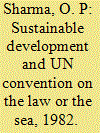

|
|
|
|
|
| Publication |
2014.
|
| Summary/Abstract |
United Nations Conference on Environment & Development (UNCED), Rio de Janeiro, 1992 In 1992, five years after the publication of the Brundtland Report, the United Nations Conference on Environment & Development (UNCED), known as the Earth Summit, took place in Rio de Janeiro, Brazil, between 3 and 14 June 1992. The Rio Summit brought together 182 world leaders - delegates from UN agencies and international organisations as well as world media and hundreds of Non- government organisations, to build upon the 1972 Stockholm conference and the 1987 Brundtland Report, and propelled sustainability on to the international stage. The Brundtland concept of sustainable development was universally endorsed at the 1992 United Nations Conference on Environment & Development (UNCED). The concept as elaborated by UNCED represents a new paradigm, a new mode of thinking to serve as a guide to action. Achieving sustainable development involves a process of decision- making in which certain questions are asked and appropriate choices and decisions made. Thus, there is never an end-state of sustainable development but a process that constantly tries to harmonise the needs of development with the maintenance of integrity of the Third United Nations Conference on the Law of the Sea for all the Sessions of the Conference between 1975 and 1982.
|
|
|
|
|
|
|
|
|
|
|
|
|
|
|
|
| 11 |
ID:
162045


|
|
|
| 12 |
ID:
047125
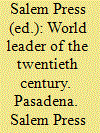

|
|
|
|
|
| Publication |
Pasadena, Salem Press INC, 2000.
|
| Description |
2v. (xx, 419-838p.)Hbk
|
| Series |
Magill's Choice
|
| Contents |
Vol. II.: William Lyon Mackenzie King-Boris Yeltsin
|
| Standard Number |
0893563374
|
|
|
|
|
|
|
|
|
|
|
|
Copies: C:1/I:0,R:0,Q:0
Circulation
| Accession# | Call# | Current Location | Status | Policy | Location |
| 044333 | 920/SAL 044333 | Main | On Shelf | General | |
|
|
|
|
|
|
|
|
|